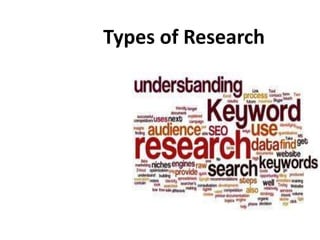10 Types of Research /The UGC NET: Research Aptitude and (Paper-1)
Introduction
In this article, you will know and learn about some important terminologies, and MCQs frequently
asked in the UGC NET Types of research paper-1.
Search means to examine closely and
carefully.
Research
· Research refers
to a diligent and systematic inquiry or investigation into a subject to discover or revise facts, theories, and applications.
· Research is the
careful, patient, and systematic study of some field of knowledge undertaken to
generalize facts.
· Research is an investigation
or experimentation aimed at the discovery and interpretation of facts, revision
of accepted theories or laws in the light of new facts, or practical
application of such new or revised theories or laws.
· Research is a
studious inquiry or examination.
· Research means to
search or investigate exhaustively.
· Research is an intensive
and purposeful search for knowledge and understanding of social and physical
phenomena.
· The three common
approaches to conducting research are quantitative, qualitative, and mixed
methods.
· Basic research studies are case, correlational, longitudinal, experimental, and clinical trial studies.
· Research methods are the specific tools and procedures you use to collect and analyze
data (experiments, surveys, and statistical tests).
Click the video link given below to learn
4 things needed for your research
Types of Research based on process
- Qualitative research
- Quantitative research
- Inductive research
- Deductive research
- Basic or fundamental research
- Applied research
- Action research
- Exploratory research
- Explanatory research
- Experimental research
- Descriptive research
- Correlational research
Exploratory research
· Exploratory research is used to explore something.
· Exploratory research is used for a new situation or formulation.
· Exploratory research develops a hypothesis.
· Exploratory research is non-conclusive in nature.
In exploratory research, only an initial study is done.
Explanatory research
· Explanatory research
is a research method that helps researchers
understand why or how something occurs, especially when there is limited
information available.
· Explanatory research
helps to increase your understanding of a given topic.
· Explanatory research
theories are multi-variable constructs that make sense of complex events and
situations.
· Some common examples of explanatory research are (a) your apologetic list of
reasons for being late to your best friend’s party. (b) to understand why
students become addicted.
6 Types of Validity Used in Research
QDA organizes, analyzes, and interprets qualitative data- non-numeric, conceptual
information, and user feedback- to capture themes and patterns, answer research
questions, and identify actions to improve your product or website.
Rigor
of analysis
The rigor of analysis in qualitative
research can be described as ensuring that the research design, method, and
conclusions are explicit, public, replicable, open to critique, and free of
bias.
Coherence
· Coherence is an
essential quality for good academic writing.
· Coherence
describes the fit between the aim, the philosophical perspective adopted, the researcher's role in the study, and the methods of investigation,
analysis, and evaluation undertaken by the researcher.
Historical
research
· Historical
research or historiography refers to an attempt to systematically recapture the
complex nuances, the people, meanings, events, and even ideas of the past that
have influenced and shaped the present.
· Historical
research is the systematic collection and objective evaluation of data related
to past occurrences to test hypotheses concerning causes, effects, or
trends of those events which may help to explain present events and anticipate
future events.
· Historical
researchers often use documentary, biographical, oral history, and archival
methods.
· Some examples of
primary sources of historical research include diaries, journals, speeches,
interviews, letters, memos, photographs, videos, public opinion polls, and
government records.
· Types of criticism
in historical research are source criticism, form criticism, redaction criticism,
tradition criticism, and radical criticism.
Internal
criticism in history
· Internal
criticism in history is also called higher criticism.
· Internal
criticism concerns the validity, credibility, or worth of the document's content.
· Internal
criticism begins once the sources are verified for their authenticity and
genuineness.
· In internal
criticism, researchers must determine whether the content is accurate.
External
criticism
· External
criticism refers to the authenticity of the document.
· External
criticism authenticates evidence and establishes texts in the most accurate
possible form.
· External
criticism is an investigation of the development of past events and their
impact on the present and future.
· In external
criticism, researchers must determine if the document is genuine.
· External
criticism depends on both primary and secondary data.
· External
criticism includes examining documents like manuscripts, books, pamphlets,
maps, inscriptions, and monuments.
· External
criticism saves the researcher from forgeries, garbled documents, partial
texts, plagiarism, ghostwriters, and interpolations.
Fixed research
·
Fixed research is quantitative in nature.
·
Fixed research is a type of structured
research.
Scientific research
Scientific
research is pre-planned, has no flexibility, and is rigid.
Mixed research
·
Mixed research is a combination of
qualitative research and quantitative research.
·
Mixed research is based on practical
situations.
·
In mixed research, there is no
triangulation.
Narrative research
Narrative
research deals with a person's life story, how a person views the world,
autobiography, and real or literary stories.
Expost
facto research
· Expost facto
research was given by Kerlinger in 1964.
· In Expost facto
research, a researcher cannot manipulate or modify actions.
· Expost facto
research focuses on how actions that have already occurred can predict certain
causes.
· Expost facto
research is a type of research design in which the investigation starts after
the fact has occurred without interference from the researcher.
· In Expost facto
research, the independent variable or variables have already occurred, and the researcher
starts with observing a dependent variable or variables.
Probability and Non-probability Sampling
Survey
A survey is a method of gathering information using relevant questions from a sample of people to understand populations as a whole.
Survey
research
Survey research is the research process using surveys that researchers send to survey respondents.
Experiment
An experiment is a research method that
incorporates scientific procedures to test a hypothesis, discover new insights, or demonstrate established facts.
Experimental
studies
· Experimental
designs are also called randomized experiments.
· Experimental
studies are studies where researchers introduce an intervention and study the
effects.
· Experimental
studies are randomized meaning the subjects are grouped by chance.
· The different
types of experimental studies are pre-experimental research design, true
experimental research design, and quasi-experimental research design.
· Some essential
characteristics of Experimental studies/ research are control, manipulation,
observation, and replication.
Ethical
theories and approaches in research
· Deontology
· Utilitarianism
· Universalism
· Ethical
relativism
· Rights
· Virtue
· Morality
· Justice and care
Deontology
· Deontology is
associated with the philosopher Immanuel Kant.
· Deontology refers
to the study of the nature of duty and obligation.
· Deontology is an
ethical theory that uses rules to distinguish right from wrong.
· Some common
ethical actions that follow universal moral laws are Don’t lie, Don’t steal,
and Don’t cheat.
Utilitarianism
Utilitarianism is the belief that the
right course of action is the one that will give the greatest happiness to the
greatest number of people.
Universalism
in research methods
· The father of universalism in research methods is
John Murray (1741-1815) and Elhanan Winchester (1751-1797).
· Universalism in
research methods refers to the principle that a given value, behavior, theory, or treatment will be the same across all groups independent of culture, race,
ethnicity, gender, and other social identities.
Ethical
relativism
Ethical relativism is the doctrine that
there are no absolute truths in ethics and that what is morally right or wrong
varies from person to person or from society to society.





No comments:
Post a Comment